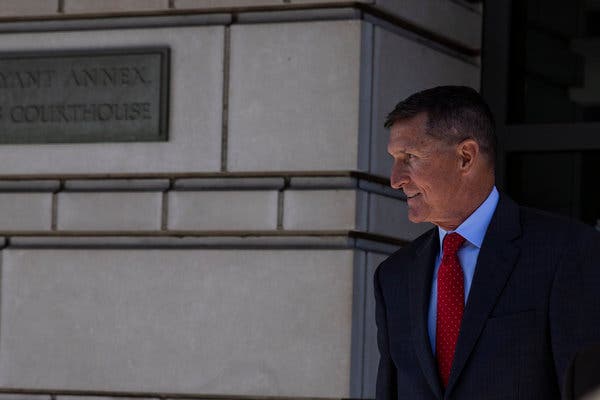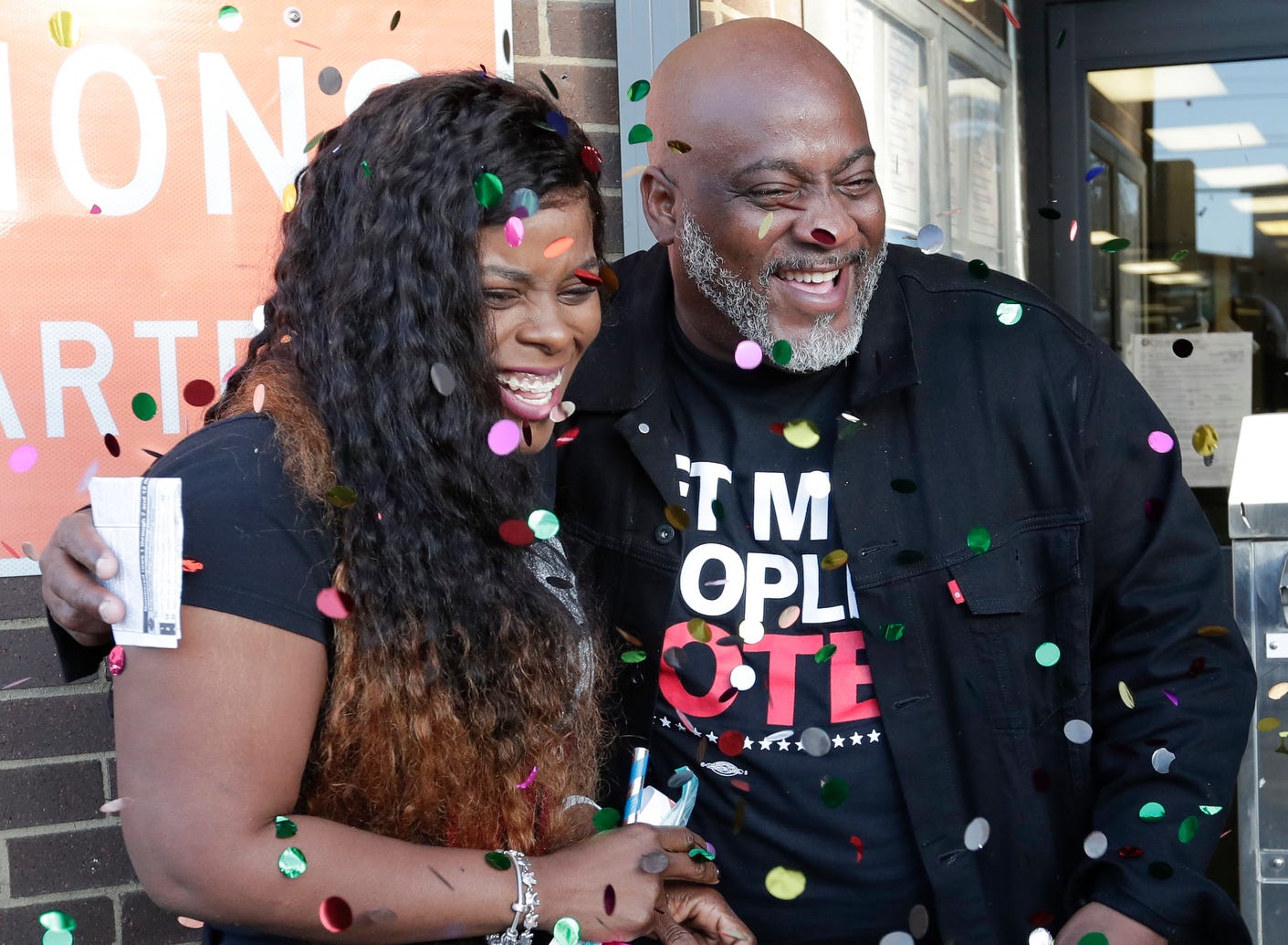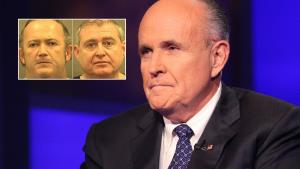Advertisement
A former federal judge said that the attorney general gave special treatment to a presidential ally, undermining public confidence in the rule of law.

WASHINGTON — A retired federal judge accused the Justice Department on Wednesday of a “gross abuse of prosecutorial power” and urged a court to reject its attempt to drop the criminal case against Michael T. Flynn, President Trump’s former national security adviser.
The arguments in a 73-page brief by John Gleeson, the retired judge and former mafia prosecutor appointed to argue against the Justice Department’s unusual effort to drop the Flynn case, were the latest turn in a politically charged case that now centers on the question of whether Mr. Flynn should continue to be prosecuted. He said Mr. Flynn should be sentenced.
The Justice Department’s intervention last month, directed by Attorney General William P. Barr, came after a long public campaign by Mr. Trump and his allies and prompted an outcry from former law enforcement officials that the administration was further politicizing the department.
Mr. Flynn’s lawyers and the Justice Department have sought to bypass Mr. Gleeson and the federal judge in the case who appointed him, Emmet G. Sullivan. An appeals panel will hear arguments on Friday about whether to dismiss the case without allowing Judge Sullivan to conduct his review of the department’s request to withdraw the charge against Mr. Flynn.
Mr. Gleeson’s brief amounted to a step-by-step dissection of the factual claims and legal arguments the Justice Department put forward last month to justify withdrawing a charge of making false statements that Mr. Flynn had twice pleaded guilty to. Mr. Gleeson said the department’s intervention was an example of the kind of “corrupt, politically motivated dismissals” that judges have the power to guard against.
“The reasons offered by the government are so irregular, and so obviously pretextual, that they are deficient,” Mr. Gleeson wrote. “Moreover, the facts surrounding the filing of the government’s motion constitute clear evidence of gross prosecutorial abuse. They reveal an unconvincing effort to disguise as legitimate a decision to dismiss that is based solely on the fact that Flynn is a political ally of President Trump.”
But he also said that Mr. Flynn should not be held in criminal contempt of court for lying under oath when he gave conflicting statements about his actions to Judge Sullivan, a possibility that the judge had raised when appointing Mr. Gleeson last month.
The Justice Department plans to file its response to Mr. Gleeson’s brief in the coming days. But it is not clear whether the judge will get to complete his review and make the final decision. Mr. Flynn’s lawyer, Sidney Powell, and the Justice Department have asked the Court of Appeals for the District of Columbia Circuit to order him to dismiss the case against Mr. Flynn without further review.
They accused Judge Sullivan of abusing his power by appointing Mr. Gleeson to offer counterarguments rather than immediately ending the matter, citing a 2016 opinion by the appeals court that said that the judiciary “generally lacks authority to second-guess” executive branch decisions about whether to charge or drop a case.
In a filing last week before the appeals court, a lawyer for Judge Sullivan urged a three-judge panel not to short-circuit his review, saying he would not necessarily adopt the arguments put forward by Mr. Gleeson.
The spectacle of both the district and appeals courts simultaneously dealing with the same case is unusual, said Samuel Buell, a law professor at Duke University and a former federal prosecutor. Mr. Gleeson’s filing will not legally affect the appeals court panel’s decision on whether to end the case without further review, he said, but “it will contribute to the overall atmosphere with regard to the propriety of the government’s motion to dismiss.”
To justify Mr. Barr’s decision to drop the case, the Justice Department has argued that Mr. Flynn’s lies were not “material” to any legitimate investigation — rejecting the department’s own previous position that his lies were relevant to the counterintelligence inquiry into the scope of Russia’s covert operation to tilt the 2016 election in Mr. Trump’s favor and the nature of links to Trump campaign associates.
Mr. Gleeson, who had co-written an op-ed article calling into question the legitimacy of Mr. Barr’s intervention before Judge Sullivan appointed him, offered a blistering critique of that rationale.
“Pursuant to an active investigation into whether President Trump’s campaign officials coordinated activities with the government of Russia, one of those officials lied to the F.B.I. about coordinating activities with the government of Russia,” Mr. Gleeson wrote. “It is hard to conceive of a more material false statement than this one.”
Marching through other issues raised by Mr. Flynn’s defenders and embraced by the Justice Department, Mr. Gleeson portrayed the arguments as “absurd,” “legally unsound,” “misdirection,” “preposterous” and “empty.” He said the department’s request was both “riddled with inexplicable and elementary errors of law and fact” and departed from its position in other cases — all evidence, he said, that its rationale for dropping the case was just a pretext.
Mr. Flynn pleaded guilty in December 2017 to lying to the F.B.I. about his conversations with the Russian ambassador during the transition period after Mr. Trump won the 2016 election. The Obama administration was taking actions to punish Russia for its interference in the American democratic process, including imposing sanctions on Russian intelligence agencies and expelling Russian officials from the United States. Mr. Flynn and the Russian ambassador at the time, Sergey I. Kislyak, discussed the moves.
American officials intercepted those calls because they were wiretapping Mr. Kislyak. Recently declassified transcripts showed that Mr. Flynn urged Moscow not to escalate the dispute — holding out the prospect of working together after Inauguration Day. The ambassador later told Mr. Flynn that he had conveyed “your proposal” and that Russia’s government had decided to moderate its response as a result.
But when word of the calls began to emerge, Mr. Flynn lied to several incoming members of the administration about what the two had discussed, including the vice president-elect, Mike Pence. F.B.I. agents working on the Russia investigation decided to approach Mr. Flynn about the topic to see what he would say.
The Justice Department, in seeking to drop Mr. Flynn’s case, has portrayed that interview as baseless because the F.B.I. had been moving to close a component of the Russia inquiry where agents were scrutinizing whether Mr. Flynn might be a Russian agent before the issue of the calls arose, along with Mr. Flynn’s mysterious pattern of lying about them to his colleagues.
Mr. Gleeson argued that the calls and lies gave the F.B.I. good reason to question Mr. Flynn.
“These developments added new dimensions, as well as newfound urgency, to the F.B.I.’s ongoing investigations and the intelligence community’s counterintelligence concerns,” Mr. Gleeson wrote. “Flynn had lied to multiple incoming White House officials and concealed the true nature of his contacts with the Russian government.”
He said that Mr. Flynn’s lies had impeded lines of relevant inquiry the bureau could have pursued. He also noted that in any case, F.B.I. rules do not require, as a prerequisite for voluntary interviews, that agents must be working on an investigation that already has an established basis for suspecting a counterintelligence threat or crime exists.
“The government may not enlist a court in dismissing a case solely because the defendant is a friend and political ally of the president — and where the ostensible reasons advanced for dismissal amount to a thin and unpersuasive disguise,” wrote Mr. Gleeson, who gained fame as the prosecutor who put the Gambino crime boss John Gotti in prison, and went on to serve as a federal judge in Brooklyn from 1994 to 2016.
He added: “If the executive wishes for the judiciary to dismiss criminal charges — as opposed to issuing a pardon or taking other unilateral action — the reasons it offers must be real and credible. Its professed concerns about materiality are neither.”
Mr. Flynn twice pleaded guilty to a criminal charge of making false statements. His plea was part of a deal to cooperate with prosecutors, which also resolved Mr. Flynn’s criminal liability for lying to the F.B.I. about another part of his conversation with Mr. Kislyak involving a United Nations issue, for failing to register as a paid foreign agent of Turkey in 2016, and for signing forms where he lied about that work.
But Mr. Flynn’s case became a political cause for Mr. Trump’s supporters as the president attacked the legitimacy of the overall Russia investigation. And in January, after changing defense lawyers, Mr. Flynn sought to withdraw his guilty plea, declaring he was innocent.
Although he had previously told the court that he did lie to the F.B.I. agents, he began saying instead that he simply did not remember at the time about what he had spoken about with the Russian ambassador. Because those statements under oath to the court were conflicting, Judge Sullivan also asked Mr. Gleeson to help him evaluate whether he should impose criminal contempt-of-court sanctions on Mr. Flynn for perjury.
Instead, Mr. Gleeson wrote, Judge Sullivan should take that behavior into account when imposing a sentence on Mr. Flynn.
The Justice Department “has treated the case like no other, and in doing so has undermined the public’s confidence in the rule of law,” Mr. Gleeson wrote. “I respectfully suggest that the best response to Flynn’s perjury is not to respond in kind. Ordering a defendant to show cause why he should not be held in contempt based on a perjurious effort to withdraw a guilty plea is not what judges typically do.”
Katie Benner contributed reporting.




